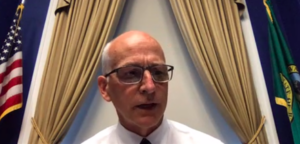Smith encouraged by Senate NDAA proposal to increase funding for space launch technology

WASHINGTON — House Armed Services Committee Chairman Adam Smith (D-Wash.) said Congress in the 2021 National Defense Authorization Act will increase funding for space launch technology development to support commercial companies.
The issue yet to be resolved is how much more funding. Smith in the chairman’s mark of the 2021 NDAA added $150 million to the National Security Space Launch research and development budget. The Senate Armed Services Committee proposed adding $30 million in 2021 as part of a long-term investment of $250 million over six years.
During a conference call with reporters June 30, Smith said the House and the Senate will figure out a compromise on the amount but that won’t be difficult because both chambers agree on the reason why this funding is needed. Regardless of whether it’s $150 million or $250 million, this is a “small amount of money relative to what we’ll be spending on launch,” he said.
The U.S. Space Force in its 2021 budget requested $560.9 million for National Security Space Launch R&D and $1 billion for procurement of launch services.
Smith’s bill adds $150 million specifically for investments focused on the National Security Space Launch Phase 3 competition.
The Department of the Air Force will award two contracts this summer for the NSSL Phase 2 procurement. Blue Origin, Northrop Grumman, SpaceX and United Launch Alliance are competing in the program.
Smith’s bill backs the Air Force’s plan to select two providers in Phase 2 but accelerates the timeline for the Air Force to begin investing in technologies for Phase 3.
The Air Force said it planned to begin investing in Phase 3 by 2023 but Smith worries that the two companies that don’t win Phase 2 could exit the national security space launch market and that the government can prevent that by accelerating investments.
Keeping more players in the game is important “to maintain competition and encourage innovation,” said Smith. “I’m encouraged the Senate has language this year. They didn’t last year and we are evolving in that conversation,” he said. “I think we can reconcile and meet that goals.”
The problem is that once the two winners of Phase 2 are selected, there is no more competition for several years, said Smith. “I want to make sure there’s competition.” His bill would require the Space Force to competitively award $150 million in R&D contracts.
It’s costly for commercial companies to meet the requirements of national security launch, he said. “That’s why I want economic support for these companies, so they don’t exit national security launch and just do commercial,” Smith said. “Here’s some money to help you do the things that you need to be ready to compete in Phase 3. That is our goal.”
Smith insisted that the Phase 3 funding should start sooner rather than later. “We think it’s pretty important to have some money in fiscal year 2021 so whichever companies lose, if they want to stay in the national security launch business, they get some economic support to do that,” he said. “I think this is a decade-long investment for the Air Force to make sure that competition is there, to make sure that these companies don’t go off and not compete.”
from SpaceNews.com https://ift.tt/3is4ihc
Comments
Post a Comment